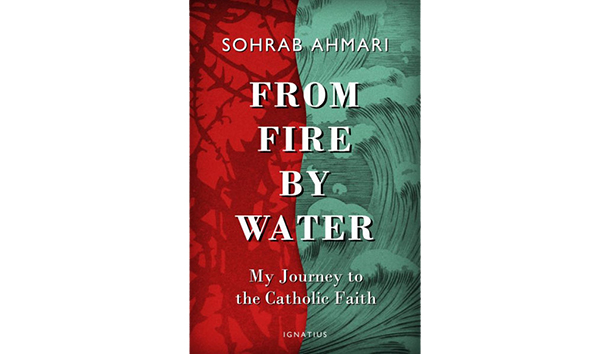From Fire, by Water: My Journey to the Catholic Faith, by Sohrab Ahmari (San Francisco: Ignatius Press; 240 pp., $22.95). Sohrab Ahmari: Iranian immigrant, Roman Catholic convert, conservative, New York Post editor, and professional David French critic. In May, Ahmari garnered criticism and notoriety for his essay “Against David French-ism,” published in First Things, in which he argued for a new conservative consensus that asserts social conservatism and Christian tradition in the “neutral spaces” of the public sphere. A former Marxist, Ahmari understands the left’s mission to dominate public spaces and institutions. Now, as a Catholic, he advocates a reconquista of the forum in the name of America’s Christian heritage. The 35-year-old London-based Iranian-American journalist’s most recent book, From Fire, by Water, details his philosophical journey from Nietzsche, through Marx, to Christ.
As a child in Iran, Ahmari, like his urbane parents, saw America as a beacon of rationalism, a potential refuge from religious ideology. He recounts, however, that upon moving from Tehran to Utah with his divorced mother at age 13, his contrarian spirit prevailed over his innate intelligence. Ahmari would spend the next decade attempting to spite his Mormon acquaintances by smoking, drinking, and reading Marxist literature. He regrets that “if only I had known that in America in 2003, self-indulgence was the norm, and self-denial the countercultural act par excellence.”
Ahmari became active in a Utah Marxist group and eventually saw the folly of their ideological devotion: “Their dourness, their indifference to anything outside their ideological bubble…reminded me of the Khomeinists of my childhood.” He tells how teaching in inner-city schools taught him that diligence and order, rather than the redistribution of wealth, were required to lift up poverty-stricken American communities.
Ahmari’s rejection of Marxism initially led him to the establishment neoliberalism of the center-right, an ideology he held as he wrote for The Wall Street Journal’s editorial page. But he became skeptical of the ability of free markets and multiculturalism to support a free government: “A skeptical and infertile West lacked the spiritual resources to deal with an energetic and virile Islam. Something more was called for.” Ahmari also writes: “Even as I hailed ‘free people, free markets’ as a Journal editorial writer, a revulsion was growing in me of market democracies that lacked an absolute authority to say no to their sins.”
After a phase of self-reflection, a dangerous investigative journalism trip to the slums of Istanbul, and a move to London with his new wife, Ahmari began to investigate and eventually convert to Catholicism.
Ahmari’s account of his intellectual pilgrimage from modernity to the Roman Church, intertwined with his physical journey from Tehran, through Utah, to London is an engaging, relevant, and quick read. Ahmari’s unique testimony proves helpful to understanding the rise of social conservatism and the religious revival among young, Catholic conservatives.



Leave a Reply